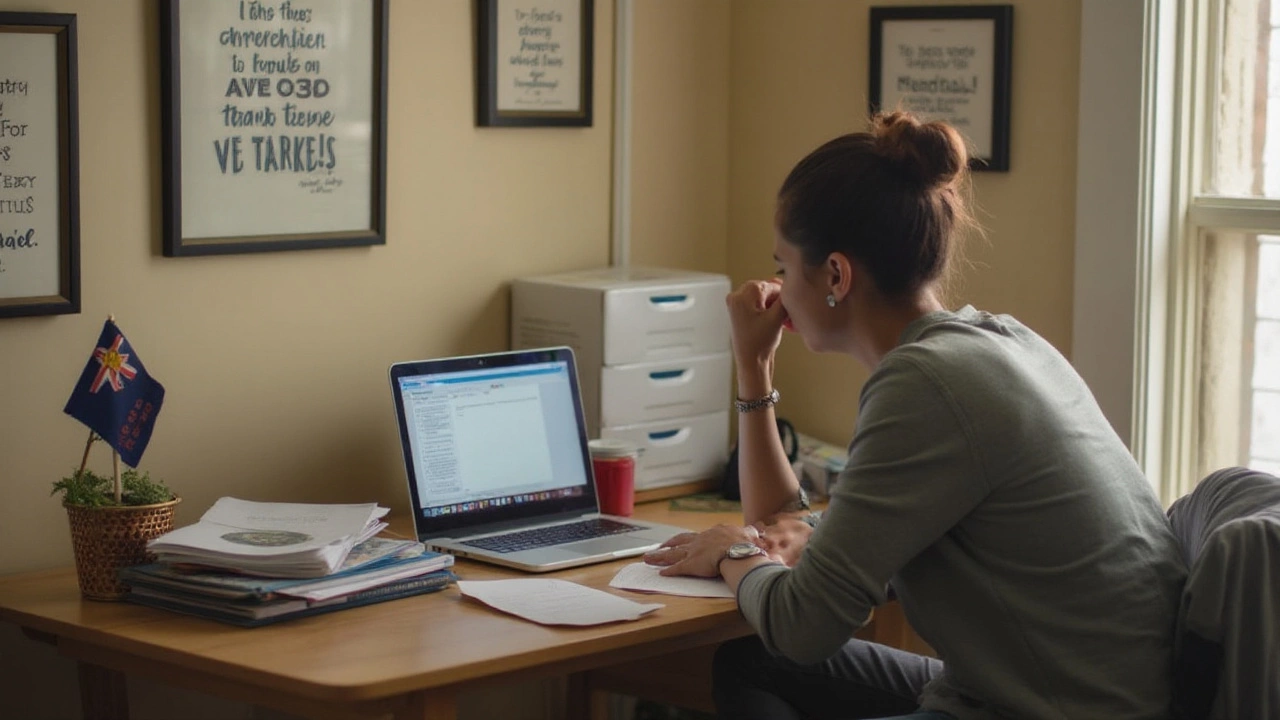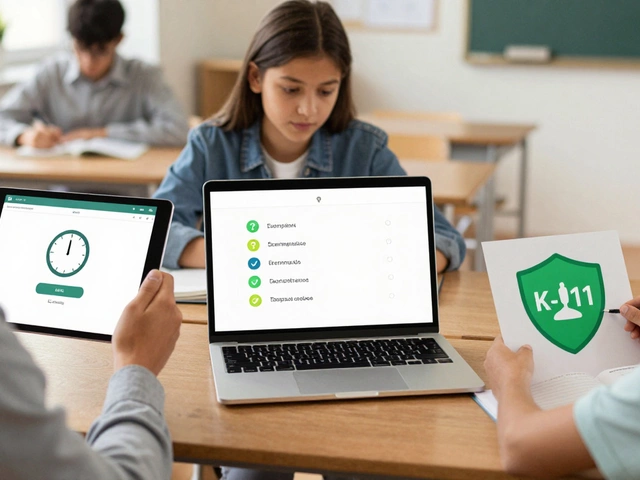Dec
16

- by Dhruv Ainsley
- 0 Comments
Embarking on a teaching career in Virginia is a journey filled with both challenges and rewarding opportunities. Aspiring educators must first navigate the path to obtaining their teaching certificate, which serves as an essential credential for entering the classroom.
Virginia takes pride in its education standards, ensuring that teachers are well-prepared to foster the next generation of leaders. This article unpacks the certification process, offering valuable insights and tips to guide you from start to finish. Whether you're fresh out of college or considering a career change, understanding what lies ahead is key to a successful teaching career in Virginia.
- Understanding Certification Requirements
- Choosing Accredited Programs
- Applying for Initial Licensure
- Completing State-Mandated Assessments
- Exploring Provisional Licensing
- Tips for a Successful Certification Journey
Understanding Certification Requirements
The process of acquiring a Virginia teaching certificate starts with understanding the specific licensure requirements. Virginia has a structured approach, ensuring applicants meet high educational and ethical standards, which is crucial for maintaining a well-qualified teaching workforce.
For starters, potential applicants need to possess at least a bachelor's degree from a regionally accredited college or university. This degree lays the groundwork for specialized education degrees or teaching endorsements specific to the subject and grade level they intend to teach. Additionally, candidates must complete an approved teacher preparation program. These programs are designed to equip future educators with the pedagogical skills and content knowledge necessary to thrive in a classroom setting. They often include coursework in educational psychology, classroom management, and instructional strategies. A critical part of these programs is the student teaching experience, which offers hands-on practice under the mentorship of experienced teachers.
Moreover, applicants are required to pass several standardized tests, including the Praxis series. The Praxis Core assesses general academic skills, whereas subject-specific Praxis tests or the Virginia Communication and Literacy Assessment (VCLA) evaluate content knowledge and teaching capabilities. Meeting these testing requirements demonstrates the candidate's aptitude for teaching and ensures they have the foundational skills to support diverse student learning needs.
Beyond academic and testing requirements, prospective educators must also complete training in child abuse recognition and intervention and hold a valid certification in emergency first aid, CPR, and the use of automated external defibrillators (AEDs). These additional stipulations are indicative of Virginia's commitment to the well-being and safety of students within educational environments. Interestingly, an informal survey conducted by the Virginia Department of Education found that over 85% of first-time teacher applicants successfully passed their exams on the first attempt, highlighting both the effectiveness of preparation programs and the readiness of candidates.
Additionally, the state mandates a comprehensive background check, including fingerprinting conducted through the Virginia State Police and the FBI. This process helps maintain a secure learning environment by ensuring that those entering the profession meet Virginia's high ethical standards. Furthermore, as Katherine Bassett, CEO of the National Network of State Teachers of the Year, once remarked,
"Teachers are not just pedagogues; they are pillars of their community, entrusted with the responsibility to mold future citizens."Such rigorous entry requirements help maintain public trust and ensure quality education across Virginia’s schools.
Choosing Accredited Programs
When it comes to obtaining a Virginia teaching certificate, selecting the right educational pathway is a cornerstone of success. As prospective teachers, it's crucial to choose programs that are recognized and approved by the Virginia Department of Education. Accreditation ensures that the curriculum meets rigorous academic standards and prepares candidates effectively for the demands of the classroom. Typically, aspiring teachers consider programs at well-established colleges and universities which have earned accreditation through organizations like the Council for the Accreditation of Educator Preparation (CAEP).
Accredited programs offer numerous advantages, not least of which is the assurance of quality education. These programs are crafted to imbue future teachers with both foundational knowledge and practical skills necessary for teaching. In Virginia, students have the option to pursue a traditional four-year undergraduate degree in education or opt for alternative routes such as post-baccalaureate certificates or master's degree programs. Teacher certification programs generally encompass supervised teaching experiences, allowing students to gain hands-on practice in a real classroom setting—a critical element in the preparation process.
Engaging with an accredited program also opens doors to broader support networks. Many universities partner with local schools, providing teaching candidates with mentorship opportunities and practical insights into the education landscape. These connections can be invaluable, offering guidance, resources, and sometimes even job placement assistance post-graduation. As Dr. Janet L. Webster, a renowned educator, observes,
"The strength of an accredited teaching program lies in its commitment to bridge theory with practice, ensuring that students become not just educators, but innovators in their fields."
For those considering alternative programs, Virginia also supports a number of 'career switcher' initiatives, designed for individuals transitioning from other professions into teaching. These programs typically focus on fast-tracking certified candidates by immersing them in targeted coursework and classroom training. They are particularly attractive to those who possess a subject-matter degree and are eager to begin teaching without going through a traditional educational pathway.
Statistics suggest that accredited programs significantly enhance the likelihood of passing the required state licensure exams. In 2022, of those enrolled in CAEP-accredited programs in Virginia, 86% passed their licensure exams on the first attempt. Such figures underscore the value of committing to an accredited journey. Therefore, investing the time to research and select a program that aligns with one's career goals and personal circumstances not only sets the stage for licensure success but provides a fulfilling and sustainable career in education.

Applying for Initial Licensure
Securing your initial teaching licensure in Virginia is an exciting step in your journey to becoming a certified teacher. It's a dynamic process that requires attention to detail and a clear understanding of state requirements. First and foremost, you'll need a bachelor’s degree from an accredited institution. This is the foundational stepping stone that qualifies you to teach in a Virginia classroom. The degree should ideally be in education or the specific subject area you wish to teach. Virginia places a strong emphasis on subject matter expertise, ensuring teachers can effectively deliver the curriculum.
Once you've secured your degree, the next step is completing a state-approved teacher preparation program. These programs are designed to equip aspiring teachers with the necessary skills and knowledge to succeed. They often include coursework in pedagogy, classroom management, and instructional strategies, complemented by a practicum or student teaching experience in a real classroom environment. This hands-on experience is invaluable, allowing you to apply theoretical concepts in a practical setting and receive feedback from seasoned educators.
An interesting quote from the Virginia Department of Education encapsulates the essence of these programs:
"The goal of our educator preparation programs is to mold teachers who are ready to meet the diverse needs of students and inspire lifelong learning."Preparing to apply involves assembling a comprehensive application packet. Critical components include official transcripts, proof of program completion, and passing scores on required assessments such as the Praxis exams. These exams assess your proficiency in specific subjects and pedagogical knowledge. Passing them demonstrates to the Virginia Department of Education your readiness to handle the rigors of teaching.
After gathering your documents, submit your application to the Virginia Department of Education for review. Be prepared to wait several weeks for processing, as applications are meticulously evaluated to ensure compliance with state educational standards. If everything is in order, you'll receive your initial teaching licensure, a credential that opens the door to employment opportunities across the state. Note that initial licenses are typically valid for a specified period, requiring renewal, which involves ongoing professional development.
Keen attention to detail during this process enhances your chance of a successful application. Double-check requirements, confirm you meet each criterion, and ensure documentation is complete and accurate. Navigating the application process can feel daunting, but with careful planning, clear understanding of requirements, and a bit of patience, you'll soon find yourself on the path to a rewarding teaching career in Virginia.
Completing State-Mandated Assessments
To earn a Virginia teaching certificate, aspiring teachers must successfully complete several state-mandated assessments. These tests, which are essential components in Virginia's commitment to quality education, assess an individual's readiness and capability to effectively teach in the classroom. The mandatory assessments often include the Virginia Communication and Literacy Assessment (VCLA), designed to evaluate literacy and communication skills essential for all teachers. Additionally, the Praxis Subject Assessments gauge specific subject knowledge and teaching ability for various specialties.
Preparation for these tests requires dedication and a strategic plan. Test-takers should familiarize themselves with the test formats and practice extensively with sample questions. Numerous online resources, such as practice tests and study groups, aid in this process, providing prospective educators with the tools they need to succeed. Some teachers find it beneficial to participate in workshops or review courses offered by institutions or educational organizations for a more structured approach. Highlighting the importance of these assessments, renowned educator Dr. Amelia Reynolds stated,
"State assessments are not just a formality; they're an opportunity to benchmark the skills that ensure our educators can deliver the highest quality education."
Understanding the scoring criteria and how to utilize feedback can also play a significant role in passing these assessments. Candidates should review the official Praxis website and the Virginia Department of Education's resources for insight into expected standards and essential content areas. Staying updated on any changes in requirements or test strategies can make a significant difference. Moreover, it's essential for candidates to manage their time efficiently during study sessions and ensure they are well-prepared on the test day. Joining discussions with peers can provide additional insights and tips that might not be found in solo study.
In some cases, potential educators have the option of retaking these exams. It's important to remember that failing a test initially doesn't spell the end of one's teaching aspirations; instead, it offers a chance to identify areas needing improvement. Data from 2022 reveals that approximately 15% of test-takers opt for a retake to improve their scores. This statistic underscores the importance of persistence and resilience in the certification journey. The state's education department provides guidelines on retake policies and advises candidates to utilize their full range of support systems, including academic advisors and mentoring educators.
State-mandated assessments are an integral part of Virginia's teacher certification process, ensuring educational consistency and professionalism. Aspiring teachers can benefit from understanding each step of this process and accessing the resources and support available to help them succeed. By effectively preparing for these assessments, candidates take a significant leap toward a thriving teaching career, capable of making a lasting impact within Virginia's educational landscape.

Exploring Provisional Licensing
For those aiming to secure a Virginia teaching certificate, the provisional licensing route can often serve as a practical stepping stone. This option is especially suitable for individuals transitioning into teaching from other professions or for those who are in the process of completing their formal educational requirements. The provisional license allows you to begin teaching while you simultaneously fulfill any additional state-mandated criteria for a full license. Typically, these provisional licenses are granted for a period of three years, offering ample time to meet the necessary qualifications. During this period, holders of a provisional license are expected to complete requirements such as specific coursework, exams, or other professional training as stipulated by the Virginia Department of Education.
There’s a convenience in such a pathway; it enables aspiring teachers to gain hands-on experience in the classroom environment while they finalize their credentialing. This pragmatic approach benefits both the teaching aspirant and educational institutions seeking to address immediate staffing needs. Yet, it's crucial to approach this period proactively. Candidates should map out a clear plan to complete outstanding requirements, taking advantage of resources such as professional development workshops, mentorship opportunities, which are often accessible through school districts. Meeting with a district’s human resources or certification personnel can provide clarity on individual requirements, ensuring that the journey from provisional to full certification is seamless.
As Tony Wagner, an esteemed education specialist, once stated,
"The world doesn't care what you know. What the world cares about is what you can do with what you know."This insight resonates profoundly within the context of Virginia’s provisional licensing as it allows educators to demonstrate their competence and ultimately their impact through teaching. The provisional license, therefore, acts as a practical field test, paving the way for educators to adapt their knowledge to real-world teaching scenarios. It stands to reason, then, that this period is crucial not just in fulfilling technical requirements but also in refining one's teaching philosophy and methodology.
Moreover, while holding a provisional license, it’s worthwhile to stay informed about any changes in the requirements or educational policies that may impact your path to full certification. Engaging with professional networks can be invaluable, offering peer support and insights into best practices. The Virginia Department of Education website often provides updates and resources tailored to assist provisional license holders in achieving their teaching goals. As schools, districts, and states place increasing emphasis on qualified staff, transitioning from a provisional to a fully certified teacher a necessary pursuit.
Tips for a Successful Certification Journey
Starting your path toward earning a Virginia teaching certificate is an exciting endeavor. As you stand on the brink of influencing young minds, it's crucial to approach the certification process strategically. Preparation is key. Begin by immersing yourself in Virginia's specific educational standards and certification requirements to gain a strong understanding of what the state expects from its educators. This foundational knowledge will guide your journey and help identify what steps need prioritizing. It's beneficial to connect with fellow educators or mentors who have navigated this path; their insights can provide invaluable real-world advice that textbooks and online resources might not offer. They might share how they balanced studying for necessary exams while completing classroom experiences or volunteer work, highlighting the importance of time management and focus in this demanding process.
A pivotal tip is to ensure enrollment in an accredited program. This not only prepares you academically and professionally but also guarantees that your application will be recognized by the licensure board. Accredited programs often align their curriculum with state standards and employ experienced faculty who can offer personalized support. Engage with your teachers and peers in these settings, asking questions and participating actively to deepen your understanding. Additionally, taking advantage of any student teaching opportunities or internships offered by your institution can provide practical experience, making theoretical knowledge tangible. Such experiences not only bolster your resume but also enhance your confidence in a real teacher's role.
Consider preparing for state-mandated assessments well in advance. Understanding the structure and content of tests such as the Praxis exams can significantly impact your performance. There are myriad resources available, ranging from online practice tests to study guides tailored to the Virginia certification requirements. Join study groups to help fill gaps in your knowledge and to stay motivated. Additionally, it might be worth attending workshops or online webinars from educational institutes known for preparing teachers for these assessments. As the saying goes in education, 'Practice doesn't make perfect, it makes permanent,' which underscores the value of consistent and thorough preparation.
Gathering the necessary documentation and ensuring everything is complete can often be the most stressful part of the certification process, so keep a checklist of required documents such as transcripts, proof of completed coursework, and examination scores. Timely application submission shows professionalism and readiness. Double-checking each document can prevent avoidable delays. Have a friend or colleague review your application to catch anything you might have missed. Following the application, be patient, and use the waiting time as an opportunity for professional development. Perhaps delve into new teaching methodologies or technologies in education. By keeping busy, you transform a stressful waiting period into a productive time of growth.
Now, a final piece of wisdom from veteran teacher Elizabeth Green, "No certification exam will truly prepare you for the ever-changing dynamics of a real classroom, but the certification process equips you with the essential tools and confidence to begin the journey." Indeed, success isn't just in passing exams or obtaining your teaching license; it's about preparing authentically to inspire and educate students effectively. Use each step of the certification process as a learning opportunity, shaping you into the teacher who makes a significant impact in students' lives.





